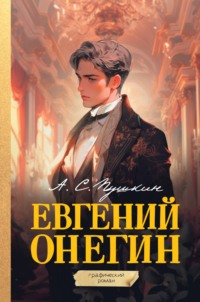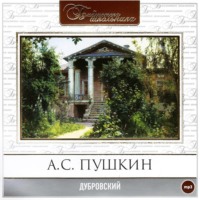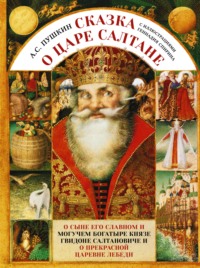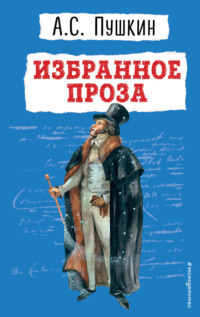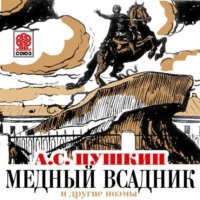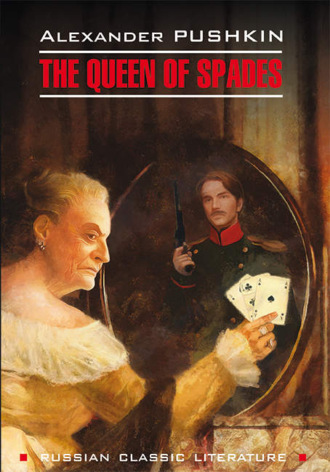
Полная версия
Пиковая дама / The Queen of Spades
Thus was my education finished.
I lived like a stay-at-home son (nédorossíl)[4], amusing myself by scaring the pigeons on the roofs, and playing leapfrog with the lads of the courtyard[5], till I was past the age of sixteen. But at this age my life underwent a great change.
One autumn day, my mother was making honey jam in her parlour, while, licking my lips, I was watching the operations, and occasionally tasting the boiling liquid. My father, seated by the window, had just opened the Court Almanack, which he received every year. He was very fond of this book; he never read it except with great attention, and it had the power of upsetting his temper very much. My mother, who knew all his whims and habits by heart, generally tried to keep the unlucky book hidden, so that sometimes whole months passed without the Court Almanack falling beneath his eye. On the other hand, when he did chance to find it, he never left it for hours together. He was now reading it, frequently shrugging his shoulders, and muttering, half aloud —
“General! He was sergeant in my company. Knight of the Orders of Russia! Was it so long ago that we —”
At last my father threw the Almanack away from him on the sofa, and remained deep in a brown study, which never betokened anything good.
“Avdotia Vassiliévna,”[6] said he, sharply addressing my mother, “how old is Petróusha[7]?”
“His seventeenth year has just begun,” replied my mother. “Petróusha was born the same year our Aunt Anastasia Garasimofna[8] lost an eye, and that – ”
“All right,” resumed my father; “it is time he should serve. ’tis time he should cease running in and out of the maids’ rooms and climbing into the dovecote.”
The thought of a coming separation made such an impression on my mother that she dropped her spoon into her saucepan, and her eyes filled with tears. As for me, it is difficult to express the joy which took possession of me. The idea of service was mingled in my mind with the liberty and pleasures offered by the town of Petersburg. I already saw myself officer of the Guard, which was, in my opinion, the height of human happiness.
My father neither liked to change his plans, nor to defer the execution of them. The day of my departure was at once fixed. The evening before my father told me that he was going to give me a letter for my future superior officer, and bid me bring him pen and paper.
“Don’t forget, Andréj Petróvitch,” said my mother, “to remember me to Prince Banojik; tell him I hope he will do all he can for my Petróusha.”
“What nonsense!” cried my father, frowning. “Why do you wish me to write to Prince Banojik?”
“But you have just told us you are good enough to write to Petróusha’s superior officer.”
“Well, what of that?”
“But Prince Banojik is Petróusha’s superior officer. You know very well he is on the roll of the Séménofsky regiment.”
“On the roll! What is it to me whether he be on the roll or no? Petróusha shall not go to Petersburg! What would he learn there? To spend money and commit follies. No, he shall serve with the army, he shall smell powder, he shall become a soldier and not an idler of the Guard, he shall wear out the straps of his knapsack. Where is his commission? Give it to me.”
My mother went to find my commission, which she kept in a box with my christening clothes, and gave it to my father with, a trembling hand. My father read it with attention, laid it before him on the table, and began his letter.
Curiosity pricked me.
“Where shall I be sent,” thought I, “if not to Petersburg?”
I never took my eyes off my father’s pen as it travelled slowly over the paper. At last he finished his letter, put it with my commission into the same cover, took off his spectacles, called me, and said:
“This letter is addressed to Andréj Karlovitch R., my old friend and comrade. You are to go to Orenburg[9] to serve under him.”
All my brilliant expectations and high hopes vanished. Instead of the gay and lively life of Petersburg, I was doomed to a dull life in a far and wild country. Military service, which a moment before I thought would be delightful, now seemed horrible to me. But there was nothing for it but resignation. On the morning of the following day a travelling kibitka stood before the hall door. There were packed in it a trunk and a box containing a tea service, and some napkins tied up full of rolls and little cakes, the last I should get of home pampering.
My parents gave me their blessing, and my father said to me:
“Good-bye, Petr’; serve faithfully he to whom you have sworn fidelity; obey your superiors; do not seek for favours; do not struggle after active service, but do not refuse it either, and remember the proverb, ’take care of your coat while it is new, and of your honour while it is young.’”
My mother tearfully begged me not to neglect my health, and bade Savéliitch take great care of the darling. I was dressed in a short “touloup”[10] of hareskin, and over it a thick pelisse of foxskin. I seated myself in the kibitka with Savéliitch, and started for my destination, crying bitterly.
I arrived at Simbirsk during the night, where I was to stay twenty-four hours, that Savéliitch might do sundry commissions entrusted to him. I remained at an inn, while Savéliitch went out to get what he wanted. Tired of looking out at the windows upon a dirty lane, I began wandering about the rooms of the inn. I went into the billiard room. I found there a tall gentleman, about forty years of age, with long, black moustachios, in a dressing-gown, a cue in his hand, and a pipe in his mouth. He was playing with the marker, who was to have a glass of brandy if he won, and, if he lost, was to crawl under the table on all fours. I stayed to watch them; the longer their games lasted, the more frequent became the all-fours performance, till at last the marker remained entirely under the table. The gentleman addressed to him some strong remarks, as a funeral sermon, and proposed that I should play a game with him. I replied that I did not know how to play billiards. Probably it seemed to him very odd. He looked at me with a sort of pity. Nevertheless, he continued talking to me. I learnt that his name was Iván Ivánovitch[11] Zourine, that he commanded a troop in the ::th Hussars, that he was recruiting just now at Simbirsk, and that he had established himself at the same inn as myself. Zourine asked me to lunch with him, soldier fashion, and, as we say, on what Heaven provides. I accepted with pleasure; we sat down to table; Zourine drank a great deal, and pressed me to drink, telling me I must get accustomed to the service. He told good stories, which made me roar with laughter, and we got up from table the best of friends. Then he proposed to teach me billiards.
“It is,” said he, “a necessity for soldiers like us. Suppose, for instance, you come to a little town; what are you to do? One cannot always find a Jew to afford one sport. In short, you must go to the inn and play billiards, and to play you must know how to play.”
These reasons completely convinced me, and with great ardour I began taking my lesson. Zourine encouraged me loudly; he was surprised at my rapid progress, and after a few lessons he proposed that we should play for money, were it only for a “groch” (two kopeks)[12], not for the profit, but that we might not play for nothing, which, according to him, was a very bad habit.
I agreed to this, and Zourine called for punch; then he advised me to taste it, always repeating that I must get accustomed to the service.
“And what,” said he, “would the service be without punch?”
I followed his advice. We continued playing, and the more I sipped my glass, the bolder I became. My balls flew beyond the cushions. I got angry; I was impertinent to the marker who scored for us. I raised the stake; in short, I behaved like a little boy just set free from school. Thus the time passed very quickly. At last Zourine glanced at the clock, put down his cue, and told me I had lost a hundred roubles[13]. This disconcerted me very much; my money was in the hands of Savéliitch. I was beginning to mumble excuses, when Zourine said:
“But don’t trouble yourself; I can wait, and now let us go to Arinúshka’s.”
What could you expect? I finished my day as foolishly as I had begun it. We supped with this Arinúshka. Zourine always filled up my glass, repeating that I must get accustomed to the service.
Upon leaving the table I could scarcely stand. At midnight Zourine took me back to the inn.
Savéliitch came to meet us at the door.
“What has befallen you?” he said to me in a melancholy voice, when he saw the undoubted signs of my zeal for the service. “Where did you thus swill yourself? Oh! good heavens! such a misfortune never happened before.”
“Hold your tongue, old owl,” I replied, stammering; “I am sure you are drunk. Go to bed, … but first help me to bed.”
The next day I awoke with a bad headache. I only remembered confusedly the occurrences of the past evening. My meditations were broken by Savéliitch, who came into my room with a cup of tea.
“You begin early making free, Petr’ Andréjïtch,” he said to me, shaking his head. “Well, where do you get it from? It seems to me that neither your father nor your grandfather were drunkards. We needn’t talk of your mother; she has never touched a drop of anything since she was born, except ‘kvassí[14]. So whose fault is it? Whose but the confounded ‘moussié’; he taught you fine things, that son of a dog, and well worth the trouble of taking a Pagan for your servant, as if our master had not had enough servants of his own!”
I was ashamed. I turned round and said to him:
“Go away, Savéliitch; I don’t want any tea.”
But it was impossible to quiet Savéliitch when once he had begun to sermonize.
“Do you see now, Petr’ Andréjïtch,” said he, “what it is to commit follies? You have a headache; you won’t take anything. A man who gets drunk is good for nothing. Do take a little pickled cucumber with honey or half a glass of brandy to sober you. What do you think?”
At this moment a little boy came in, who brought me a note from Zourine. I unfolded it and read as follows:
“DEAR PETR’ ANDRÉJÏTCH,
“Oblige me by sending by bearer the hundred roubles you lost to me yesterday. I want money dreadfully.
“Your devoted
“IVÁN ZOURINE.”
There was nothing for it. I assumed a look of indifference, and, addressing myself to Savéliitch, I bid him hand over a hundred roubles to the little boy.
“What – why?” he asked me in great surprise.
“I owe them to him,” I answered as coldly as possible.
“You owe them to him!” retorted Savéliitch, whose surprise became greater. “When had you the time to run up such a debt? It is impossible. Do what you please, excellency, but I will not give this money.”
I then considered that, if in this decisive moment I did not oblige this obstinate old man to obey me, it would be difficult for me in future to free myself from his tutelage. Glancing at him haughtily, I said to him:
“I am your master; you are my servant. The money is mine; I lost it because I chose to lose it. I advise you not to be headstrong, and to obey your orders.”
My words made such an impression on Savéliitch that he clasped his hands and remained dumb and motionless.
“What are you standing there for like a stock?” I exclaimed, angrily.
Savéliitch began to weep.
“Oh! my father, Petr’ Andréjïtch,” sobbed he, in a trembling voice; “do not make me die of sorrow. Oh! my light, hearken to me who am old; write to this robber that you were only joking, that we never had so much money. A hundred roubles! Good heavens! Tell him your parents have strictly forbidden you to play for anything but nuts.”
“Will you hold your tongue?” said I, hastily, interrupting him. “Hand over the money, or I will kick you out of the place.”
Savéliitch looked at me with a deep expression of sorrow, and went to fetch my money. I was sorry for the poor old man, but I wished to assert myself, and prove that I was not a child. Zourine got his hundred roubles.
Savéliitch was in haste to get me away from this unlucky inn; he came in telling me the horses were harnessed. I left Simbirsk with an uneasy conscience, and with some silent remorse, without taking leave of my instructor, whom I little thought I should ever see again.
Chapter II. The Guide
My reflections during the journey were not very pleasant. According to the value of money at that time, my loss was of some importance. I could not but confess to myself that my conduct at the Simbirsk Inn had been most foolish, and I felt guilty toward Savéliitch. All this worried me. The old man sat, in sulky silence, in the forepart of the sledge, with his face averted, every now and then giving a cross little cough. I had firmly resolved to make peace with him, but I did not know how to begin. At last I said to him:
“Look here, Savéliitch, let us have done with all this; let us make peace.”
“Oh! my little father, Petr’ Andréjïtch,” he replied, with a deep sigh, “I am angry with myself; it is I who am to blame for everything. What possessed me to leave you alone in the inn? But what could I do; the devil would have it so, else why did it occur to me to go and see my gossip the deacon’s wife, and thus it happened, as the proverb says, ‘I left the house and was taken to prison.’ What ill-luck! What ill-luck! How shall I appear again before my master and mistress? What will they say when they hear that their child is a drunkard and a gamester?”
To comfort poor Savéliitch, I gave him my word of honour that in future I would not spend a single kopek without his consent. Gradually he calmed down, though he still grumbled from time to time, shaking his head:
“A hundred roubles, it is easy to talk!”
I was approaching my destination. Around me stretched a wild and dreary desert, intersected by little hills and deep ravines. All was covered with snow. The sun was setting. My kibitka was following the narrow road, or rather the track, left by the sledges of the peasants. All at once my driver looked round, and addressing himself to me:
“Sir,” said he, taking off his cap, “will you not order me to turn back?”
“Why?”
“The weather is uncertain. There is already a little wind. Do you not see how it is blowing about the surface snow.”
“Well, what does that matter?”
“And do you see what there is yonder?”
The driver pointed east with his whip.
“I see nothing more than the white steppe and the clear sky.”
“There, there; look, that little cloud!”
I did, in fact, perceive on the horizon a little white cloud which I had at first taken for a distant hill. My driver explained to me that this little cloud portended a “bourane”[15]. I had heard of the snowstorms peculiar to these regions, and I knew of whole caravans having been sometimes buried in the tremendous drifts of snow. Savéliitch was of the same opinion as the driver, and advised me to turn back, but the wind did not seem to me very violent, and hoping to reach in time the next posting station, I bid him try and get on quickly. He put his horses to a gallop, continually looking, however, towards the east. But the wind increased in force, the little cloud rose rapidly, became larger and thicker, at last covering the whole sky. The snow began to fall lightly at first, but soon in large flakes. The wind whistled and howled; in a moment the grey sky was lost in the whirlwind of snow which the wind raised from the earth, hiding everything around us.
“How unlucky we are, excellency,” cried the driver; “it is the bourane.”
I put my head out of the kibitka; all was darkness and confusion. The wind blew with such ferocity that it was difficult not to think it an animated being.
The snow drifted round and covered us. The horses went at a walk, and soon stopped altogether.
“Why don’t you go on?” I said, impatiently, to the driver.
“But where to?” he replied, getting out of the sledge. “Heaven only knows where we are now. There is no longer any road, and it is all dark.”
I began to scold him, but Savéliitch took his part.
“Why did you not listen to him?” he said to me, angrily. “You would have gone back to the post-house; you would have had some tea; you could have slept till morning; the storm would have blown over, and we should have started. And why such haste? Had it been to get married, now!”
Savéliitch was right. What was there to do? The snow continued to fall:a heap was rising around the kibitka. The horses stood motionless, hanging their heads and shivering from time to time.
The driver walked round them, settling their harness, as if he had nothing else to do. Savéliitch grumbled. I was looking all round in hopes of perceiving some indication of a house or a road; but I could not see anything but the confused whirling of the snowstorm.
All at once I thought I distinguished something black.
“Hullo, driver!” I exclaimed, “what is that black thing over there?”
The driver looked attentively in the direction I was pointing out.
“Heaven only knows, excellency,” replied he, resuming his seat.
“It is not a sledge, it is not a tree, and it seems to me that it moves. It must be a wolf or a man.”
I ordered him to move towards the unknown object, which came also to meet us. In two minutes I saw it was a man, and we met.
“Hey, there, good man,” the driver hailed him, “tell us, do you happen to know the road?”
“This is the road,” replied the traveller. “I am on firm ground; but what the devil good does that do you?”
“Listen, my little peasant,” said I to him, “do you know this part of the country? Can you guide us to some place where we may pass the night?”
“Do I know this country? Thank heaven,” rejoined the stranger, “I have travelled here, on horse and afoot, far and wide. But just look at this weather! One cannot keep the road. Better stay here and wait; perhaps the hurricane will cease and the sky will clear, and we shall find the road by starlight.”
His coolness gave me courage, and I resigned myself to pass the night on the steppe, commending myself to the care of Providence, when suddenly the stranger, seating himself on the driver’s seat, said:
“Grace be to God, there is a house not far off. Turn to the right, and go on.”
“Why should I go to the right?” retorted my driver, ill-humouredly.
“How do you know where the road is that you are so ready to say, ’other people’s horses, other people’s harness:whip away!’”
It seemed to me the driver was right.
“Why,” said I to the stranger, “do you think a house is not far off?”
“The wind blew from that direction,” replied he, “and I smelt smoke, a sure sign that a house is near.”
His cleverness and the acuteness of his sense of smell alike astonished me. I bid the driver go where the other wished. The horses ploughed their way through the deep snow. The kibitka advanced slowly, sometimes upraised on a drift, sometimes precipitated into a ditch, and swinging from side to side. It was very like a boat on a stormy sea.
Savéliitch groaned deeply as every moment he fell upon me. I lowered the tsinofka[16], I rolled myself up in my cloak and I went to sleep, rocked by the whistle of the storm and the lurching of the sledge. I had then a dream that I have never forgotten, and in which I still see something prophetic, as I recall the strange events of my life. The reader will forgive me if I relate it to him, as he knows, no doubt, by experience how natural it is for man to retain a vestige of superstition in spite of all the scorn for it he may think proper to assume.
I had reached the stage when the real and unreal begin to blend into the first vague visions of drowsiness. It seemed to me that the snowstorm continued, and that we were wandering in the snowy desert. All at once I thought I saw a great gate, and we entered the courtyard of our house. My first thought was a fear that my father would be angry at my involuntary return to the paternal roof, and would attribute it to a premeditated disobedience. Uneasy, I got out of my kibitka, and I saw my mother come to meet me, looking very sad.
“Don’t make a noise,” she said to me. “Your father is on his death-bed, and wishes to bid you farewell.”
Struck with horror, I followed her into the bedroom. I look round; the room is nearly dark. Near the bed some people were standing, looking sad and cast down. I approached on tiptoe. My mother raised the curtain, and said:
“Andréj Petróvitch, Petróusha has come back; he came back having heard of your illness. Give him your blessing.”
I knelt down. But to my astonishment instead of my father I saw in the bed a black-bearded peasant, who regarded me with a merry look. Full of surprise, I turned towards my mother.
“What does this mean?” I exclaimed. “It is not my father. Why do you want me to ask this peasant’s blessing?”
“It is the same thing, Petróusha,” replied my mother. “That person is your godfather[17]. Kiss his hand, and let him bless you.”
I would not consent to this. Whereupon the peasant sprang from the bed, quickly drew his axe from his belt, and began to brandish it in all directions. I wished to fly, but I could not. The room seemed to be suddenly full of corpses. I stumbled against them; my feet slipped in pools of blood. The terrible peasant called me gently, saying to me:
“Fear nothing, come near; come and let me bless you.”
Fear had stupified me....
At this moment I awoke. The horses had stopped; Savéliitch had hold of my hand.
“Get out, excellency,” said he to me; “here we are.”
“Where?” I asked, rubbing my eyes.
“At our night’s lodging. Heaven has helped us; we came by chance right upon the hedge by the house. Get out, excellency, as quick as you can, and let us see you get warm.”
I got out of the kibitka. The snowstorm still raged, but less violently. It was so dark that one might, as we say, have as well been blind. The host received us near the entrance, holding a lantern beneath the skirt of his caftan, and led us into a room, small but prettily clean, lit by a loutchina[18]. On the wall hung a long carbine and a high Cossack cap.
Our host, a Cossack of the Yaïk[19], was a peasant of about sixty, still fresh and hale. Savéliitch brought the tea canister, and asked for a fire that he might make me a cup or two of tea, of which, certainly, I never had more need. The host hastened to wait upon him.
“What has become of our guide? Where is he?” I asked Savéliitch.
“Here, your excellency,” replied a voice from above.
I raised my eyes to the recess above the stove, and I saw a black beard and two sparkling eyes.
“Well, are you cold?”
“How could I not be cold,” answered he, “in a little caftan all holes? I had a touloup, but, it’s no good hiding it, I left it yesterday in pawn at the brandy shop; the cold did not seem to me then so keen.”
At this moment the host re-entered with the boiling samovar[20]. I offered our guide a cup of tea. He at once jumped down.
I was struck by his appearance. He was a man about forty, middle height, thin, but broad-shouldered. His black beard was beginning to turn grey; his large quick eyes roved incessantly around. In his face there was an expression rather pleasant, but slightly mischievous. His hair was cut short. He wore a little torn armak[21], and wide Tartar trousers.
I offered him a cup of tea; he tasted it, and made a wry face.
“Do me the favour, your excellency,” said he to me, “to give me a glass of brandy; we Cossacks do not generally drink tea.”
I willingly acceded to his desire. The host took from one of the shelves of the press a jug and a glass, approached him, and, having looked him well in the face:
“Well, well,” said he, “so here you are again in our part of the world. Where, in heaven’s name, do you come from now?”
My guide winked in a meaning manner, and replied by the well-known saying:
“The sparrow was flying about in the orchard; he was eating hempseed; the grandmother threw a stone at him, and missed him. And you, how are you all getting on?”
“How are we all getting on?” rejoined the host, still speaking in proverbs.





